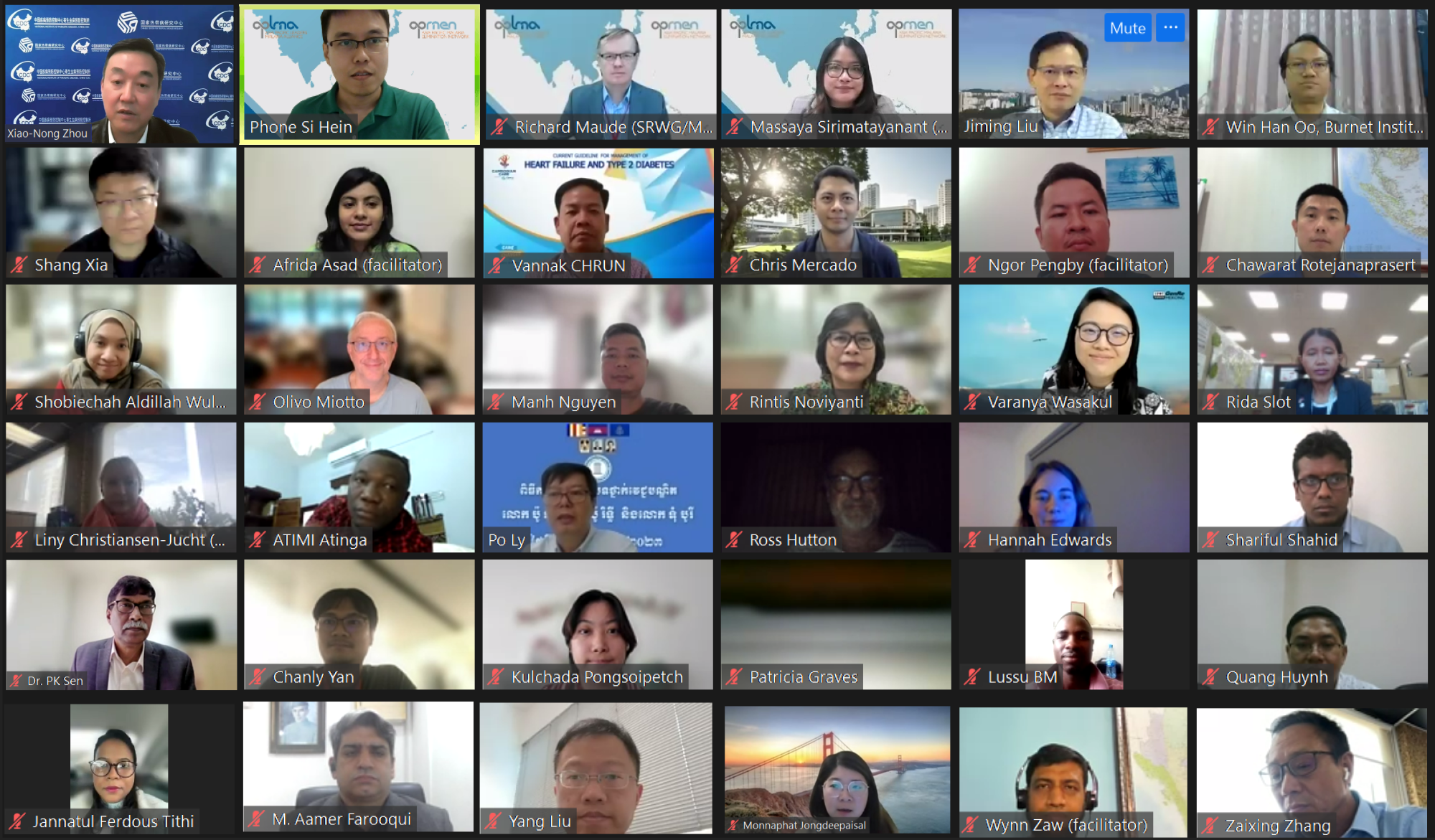
The APMEN Surveillance and Response Working Group Online Annual Meeting 2023, spanning from December 4th to 6th, was centred around the theme of 'Catalysing Innovation, Cross-Border Synergy, and Sustainable Impact: Advancing Malaria Elimination through Surveillance and Response in the Asia Pacific.' This theme reflects our collective commitment to pioneering solutions and fostering collaborations across borders with the objectives of exploring data-driven approaches, facilitating cross-border partnerships, and ensuring the sustainable impact of malaria elimination efforts across the Asia Pacific region.
“After decades of impressive progress against malaria, Asia Pacific is now trending in the wrong direction. The WHO’s recently published World Malaria Report 2023 estimated a 24% increase in cases between 2021 and 2022 in our region. Our future success will be determined by the strength of our abilities as a collective region--especially in the most vulnerable pockets of our region--to understand the most effective approaches to surveillance and response. So deep gratitude to all for so thoughtfully and engaging in the work of APMEN and in service of those most vulnerable. Let us please work together to end this disease once and for all. – Dr Sarthak Das, Chief Executive Officer, APLMA
SRWG Annual Meeting Sessions:

On the first day, we initiated discussions with a session on 'Data-Informed Interventions,' (watch recording here) featuring presentations on advancements in innovative technologies spanning genomic surveillance in the Greater Mekong Subregion and AI for risk mapping and prediction in Yunnan and Cambodia. Breakout groups delved into identifying current capacity needs and common training priorities across national malaria programs for data analysis and visualisation.

Day two shifts the focus to cross-country collaborations with a panel discussion on ‘Data Sharing and Cross-Country Collaborations for the Surveillance and Response of Border Malaria.’ Panellists explored collaborative efforts in India - Bhutan, Timor-Leste - Indonesia, and China – Myanmar (watch recording here). The plenary session updated participants on the Special Interest Group (SIG) on border malaria, engaging them in polls to prioritize key data for the SIG’s knowledge repository and identified members for the new group. APMEN members can register their interest to join this SIG by emailing massaya@tropmedres.ac.

On the last day, the focus turned towards contemplating the sustainability of malaria elimination efforts with a panel discussion on 'Sustaining Malaria Services and Health Access in Diverse Settings.' Perspectives from regional operational research, civil society organizations, and the private sector drove discussions on sustaining and integrating community health workers, a key component of the malaria elimination strategy in the region (watch recording here). An update on the SRWG’s collaboration with RBM Surveillance, Monitoring and Evaluation Working Group’s (SME WG) Community Health Committee to develop a guideline for assessing the performance of malaria Community Health Workers (CHW) was also presented. APMEN members interested in being involved in this process may email massaya@tropedres.ac.

The final session, 'Geo-enabling Malaria Interventions,' highlighted how geo-enabling strengthens health information systems (HIS), ensuring that our investments contribute to sustainability beyond malaria gains (watch recording here). Case examples of village-based malaria stratification in Cambodia and Bangladesh for microplanning targeted interventions were presented.
Breakout and plenary discussions explored key themes for shaping the foundation for SRWG’s future endeavours. Prioritizing training topics, defining plans for the SIG on border malaria, and forming writing teams for the malaria CHW assessment guidance was among the achievements. Plans to assist countries in evaluating the existing level of geo-enablement in their HIS was also proposed. This includes providing support for countries in developing action plans to address identified gaps. APMEN members can express their interest to participate in a geo-enablement assessment and action planning by filling this short google form.
A total of 166 attendees from national malaria programs and partner institutions actively participated in the three-day meeting. Participants expressed satisfaction with the SRWG Annual Meeting 2023, stating that they found the presentations and discussions highly relevant to their work, as indicated in live evaluation polls.
Key Takeaways from SRWG Annual Meeting:
Urgent Need for Collective Action:
The meeting stressed the urgent need for collective action in the Asia Pacific, with a worrying 24% increase in malaria cases according to the 2023 World Malaria Report. Emphasis was placed on the imperative to strengthen cross-country and collective regional efforts, particularly in border areas. This is crucial for determining the most effective approaches to surveillance and response, aiming for sustained elimination of malaria across all countries.
Data-Driven Strategies:
The sessions highlighted the significance of data-driven approaches in combatting malaria, showcasing the role of technological advancements in genomic surveillance, enhancing risk mapping and predicting malaria, as well as the efficiency gained through geo-enabling health information systems for delivering malaria interventions.
Sustainability of Malaria Elimination Efforts:
A central theme of the meeting focused on ensuring the sustainability of malaria investments. This was underscored through dedicated sessions discussing how to sustain and integrate malaria Community Health Workers, and the initiation of a cross-regional collaboration to develop guidelines for assessing CHWs' performance in malaria activities. The commitment extends to supporting countries in geo-enabling Health Information Systems, aiming to ensure that malaria investments contribute to the overall strengthening of the health system.
Your endorsement of country-to-country support underscores our shared commitment to further strengthen peer learning exchange between APMEN countries. Additionally, your contributions have been instrumental in shaping the SRWG and our collective pursuit of innovative solutions to sustainably eliminating malaria in the region. – Prof Xiao-Nong Zhou, Chair of APMEN SRWG
We express sincere appreciation to all participants for their unwavering dedication, active engagement, and the forging of new collaborations that drove the success of this event. Heartfelt gratitude goes to our esteemed chairs, speakers, panellists, and contributors for enriching our discussions with their insights, shaping the SRWG and our collective pursuit of innovative solutions for sustainable malaria elimination in the Asia Pacific. These three days served as a catalyst for innovation, cross-border synergy, and sustainable impact in our shared journey towards malaria elimination in the Asia Pacific.
